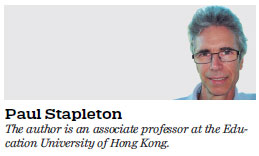Shift in perspective may expand organ donor pool
Updated: 2017-10-26 05:51
(HK Edition)
|
|||||||
The issue of organ donation in Hong Kong has reared its head again, this time because Dr Chau Ka-foon, honorary president of the Hong Kong Transplant Sports Association, has said that present procedures for willing donors were too complex and the government needs to remove barriers. Somewhat coincidentally, this complexity has potential to be solved by the work of Richard Thaler, who has just been awarded this year's Nobel Prize for Economics.
Hong Kong currently has 272,000 potential donors who have registered online at the Department of Health's website but this represents just 3 percent of the population. Meanwhile more than 2,000 people wait desperately for a transplant. Many are kidney patients who have to undergo regular dialysis just to stay alive.

In the meantime, there are well-established ways to solve this problem. But to understand the solution, one has to delve into human psychology. In particular, the way the authority frames its donor recruitment program is at least partly to blame for Hong Kong's low rate of donor participation.
Let's take an example where our government has applied a frame very successfully. In 2009, the government introduced a new law requiring retail outlets, such as supermarkets and drug stores, to charge for plastic bags. The 50-cent charge quickly led to an 80 to 90 percent reduction in the distribution of plastic bags. However, the change in behavior that resulted in most people bringing their own bags was most likely not because they were trying to save money but rather because they didn't want to pay for something that was once free. Even shoppers at high-end supermarkets who couldn't care less about the 50-cent charge now usually bring their own bags.
The plastic bag levy is a classic example of successful framing in which a former default (free plastic bags) is replaced by a new frame which results in a new default (shoppers bring their own bags). By creating a new frame, the government has nudged us to behave in a certain way that has brought about a huge reduction in plastic at our landfill sites.
As Thaler's work uncovered, such examples are actually all around us. His work revealed we can design choice environments that nudge us unconsciously in certain directions.
When we enter a supermarket, often we are nudged to buy more than one item of the same product such as oranges. In some cases the savings are minimal but the frame of "three for HK$8.90" is often strong enough to nudge us to buy three, even though the small print says HK$3 each. In fast-food restaurants, when you order a drink, it almost always comes with ice. The defaulted ice, of course, may align with customer preferences, but from the restaurants' viewpoint, it is a good way to maximize profit.
However, unlike organ donations, these frames do not involve life and death.
This discussion about framing is useful for proposing a possible solution to the low organ donation participation rate here in Hong Kong. Presently the Department of Health promotes their online donor registration, encouraging people to visit their website and sign up. So the frame is to opt yourself in. However, in this case, the default position is that no one is a donor unless they act.
Nonetheless, an obvious alternative frame is to set the default so everyone is automatically a donor unless they opt out. If new ID cards were issued with a statement on the reverse side saying, "Check the box if you do not wish to donate your organs upon death," people may have a much easier time making the decision to donate than if the sentence came without the word "not".
Spain is often mentioned as the country with the most successful participation rate. And it is no coincidence that their program follows an opt-out system. France recently followed suit.
Clearly, here in Hong Kong, such a change would require extended discussions in order to bring most of the population on board. Certainly, matters concerning life and death are not as simple as just changing the frame. For example, issues such as how to officially determine when death occurs - lack of a heartbeat or lack of brain activity - would have to be considered carefully. Doctors would also need to be trained to cope with a surge in donations. And of course, Chinese cultural preference for keeping their dead bodies intact would have to be addressed.
This is where government leadership comes in. The current household survey on organ donation being conducted by the Department of Census and Statistics, which includes an item on opting out, is a good start. But the government needs to understand and consider the concept of framing, so brilliantly revealed by Thaler, so that the local populace is given a nudge in a direction that has the potential to save thousands of lives.
(HK Edition 10/26/2017 page9)